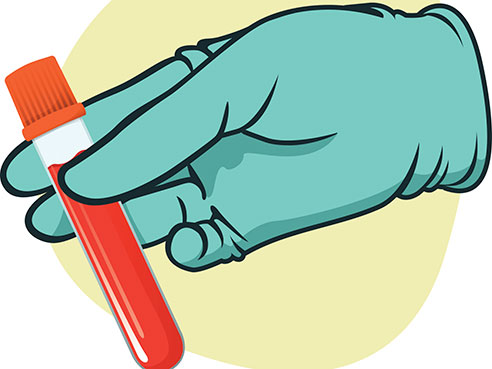 A blood test that detects antibodies to the sexually transmitted bacterium Chlamydia trachomatis may be helpful in screening infertile women for pregnancy outcomes, according to a new study.
A blood test that detects antibodies to the sexually transmitted bacterium Chlamydia trachomatis may be helpful in screening infertile women for pregnancy outcomes, according to a new study.Infertile women who tested positive for C. trachomatis antibodies were less likely to become pregnant or have a live birth. They also were more likely to experience an ectopic pregnancy, or life-threatening pregnancy outside the womb.
William M. Geisler, M.D., professor in the Division of Infectious Diseases in the University of Alabama at Birmingham Department of Medicine, was a study co-author. The study, funded by the Eunice Kennedy Shriver National Institute of Child Health and Human Development, one of the National Institutes of Health, was published in the journal Fertility and Sterility. Geisler’s laboratory performed the chlamydia antibody test.
C. trachomatis infections may produce few or no symptoms, and therefore go untreated. But the infection may cause inflammation along the reproductive tract, potentially scarring both the inside and outside of the fallopian tubes and leading to infertility in women. When evaluating women with infertility, clinicians routinely test whether the fallopian tubes are open (“patent” tubes) or blocked, which may result from a number of causes. Blocked tubes can prevent a fertilized egg from reaching the uterus, increasing the risk of ectopic pregnancy, a pregnancy that implants outside of the uterus.
However, clinicians questioned the utility of testing for C. trachomatis infection, especially in women with patent tubes. Researchers funded by NICHD’s Reproductive Medicine Network, which carries out clinical trials on interventions for infertility and reproductive diseases, looked for possible links between C. trachomatis and pregnancy outcomes in infertile women with patent tubes.
| “This work is important because it is helping us to understand not only how often the sexually transmitted infection chlamydia may cause infertility in women, but also how to identify markers that predict worse reproductive outcomes in women with infertility who are receiving treatments for their infertility to help them conceive.” |
Importantly, the team used a noncommercial blood test, called the EB ELISA, to detect two antibodies that indicate a prior or ongoing C. trachomatis infection. While there is a commercially available blood test, it also recognizes other types ofchlamydia, leading to false positive results. The researchers associated a positive EB test for one of the antibodies, called IgG3, with a lower chance of conceiving or having a live birth and with a higher chance of ectopic pregnancy.
“This work is important because it is helping us to understand not only how often the sexually transmitted infection chlamydia may cause infertility in women,” Geisler said, “but also how to identify markers that predict worse reproductive outcomes in women with infertility who are receiving treatments for their infertility to help them conceive.”
The findings open new avenues for understanding the causes of infertility and identifying pregnancy risks in women. The study authors suspect that an undiagnosed infection from C. may reduce the health of fallopian tubes despite a normal appearance, thereby reducing the likelihood of conception. Therefore, the authors suggest that screening for additional forms of tubal damage, not just for blockage, may prove useful when C. trachomatis antibodies are detected. The authors also called for a more accurate, commercially available test for this infection.